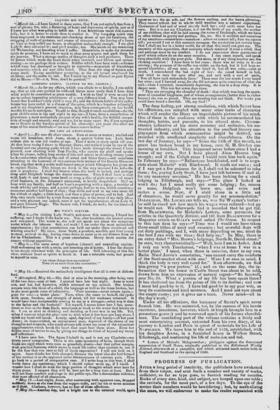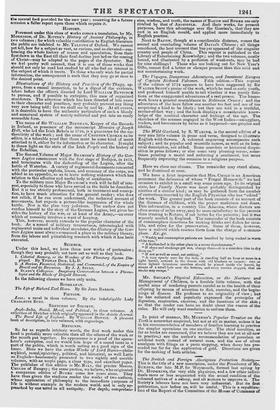PROGRESS OF PUBLICATION.
AFTER a long period of inactivity, the publishers have awakened from their torpor, and sent forth a number and variety of works, sudicient, so far as type goes, to furnish reading for months. Books of every size, kind, and subject, are heaped upon our table; the arrivals, for the most part, of a few days. To the eye of the novice their numbers would be bewildering ; but, by tnetbadizing the mass, we will endeavour to make the reader acquainted with
the mental food provided for the new year ; reserving for a future occasion a fuller report upon those which require it.
HISTORY.
Foremost under this class of works comes a translation, by Mr.
MORRISON, of Dr. RITTER'S History of Ancient Philosophy, in two volumes ; for which valuable contribution to English literature the public are indebted to Mr. TALFOYS of Oxford. We cannot yet tell, how far a subject so vast, so curious, and so elevated—em- bracing the whole history of reason and speculation, from their first dawn in the East till their final decline just before the coming of Christ—may be adapted to the pages of the Spectator. But we feel pretty well assured, that it is one of those works that should not only be read but studied by all who feel an interest in the subject of which it treats. To those who only wish for partial information, the arrangement is such that they may go at once to the desired point.
Illustrations of the History and Practices of the Thugs, ap- pears, from a casual inspection, to be a digest of the evidence, taken before the officers directed by Lord WI reesm BENTINCE to pursue, and if possible to extirpate, this race of organized murderers. The attention which has been directed of late years to their character and practices, may probably prevent any thing very new being told; but we shall see by and by. At all events, it is desirable to have the authentic particulars of such a bloody and unnatural system of society collected and put into an easily accessible form.
The name of Sir WILLIAM BEETHAM, Keeper of the Records in Ireland, as possessor of the manuscript Memoirs of Joseph Holt, who led the Irish Rebels in 1798, is a guarantee for the au- thenticity of the work ; and the name of CROFTON CROKER as its editor, is a tolerable proof that there must be sonic kind of merit attached to it, either for its information or its character. It ought to throw light on the state of the Irish People and the history of the Rebellion.
The Second Yolurne of Major Beamisres History of the Ger- man Legion commences with the first siege of Badajoz, in 1811, and terminates with the disbanding of the Legion, after the battle of Waterloo. A variety of regimental documents connected with the particular exploits, losses, and economy of the corps, are added in an appendix, so as to leave nothing unknown which has relation to this effective and useful body of auxiliaries.
To the military man Major Be NMISH'S work will be full of inte- rest, especially to those who have served in the fields he describes. But it is too strictly professional, both in treatment and concep- tion, to have much attraction for the general reader ; who dues not relish, if he can even understand, the technical account of movements, but expects a picture-like impression of the whole battle. Nor is the plan very judicious. The author does not confine himself to the story of the German Legion, but gives be- sides the history of the war, or at least of the Army,—an error which of necessity involves a want of keeping. This, however, merely extends to the popular character of the book. As a record of military transactions, intermingled with regimental traits and individual anecdotes, the History of the Ger- man Legion must always command a place in the military library, from the labour and painstaking research with which it has been executed.
SCIENCE.
Under this head, we have three new works of pretension ; though they may probably not turn out so well as they look.
1. Celestial Scenery, or the Wonders of the Planetary System Dis- played. By THOMAS DICK. LLD. 2. A Review, Financial, Statistical, and Commercial, of the Empire of Brazil and its Resources. By J. J. STURZ. 3. SLADE'S Colloquies. Imaginary Conversations between a Phreno- logist and the Shade of Dugald Stewart. In the following classes we have only units.
BIOGRAPAY.
The Life of Richard Earl Howe. By Sir .Totte BARROW.
FICTION.
Lore; a novel in three volumes. By the indefatigable Lady
CHARLOTTE BURY.
SKETCHES OF SOCIETY.
Anglo-India, Social, Moral, and Political; in three volumes. A collection of Sketches which originally appeared in the Asiatic Journal. The Rural Life V England. By WILLIAM HOWITT. A pleasant book of description, in two volumes, with engravings.
REPRINTS.
So far as regards intrinsic worth, the first work under this bead is probably more valuable than all the others of the week or the month put together. Its appearance is a proof of the specu- lator's euterprise, and we would fain hope of a sound taste in a part of the public, which is worth noting as a good sign of the times. Here we have the entire Works of Lord Bacon—philo- sophical, moral,'epistolary, political, and historical, as well Latin as English—handsomely presented in two sightly and useable volumes, with an ample page, a clear type, and excellent paper. The publisher of this edition is Mr. BALL, the printer Messrs. CHILDS of Bungay ; the same parties, we believe, who originated a companion edition of BURKE some few years since. They have thus given the studious reader the works of two authors, whose application of philosophy to the immediate Furposes of life is without example in the modern world, and is only ap- pnaached by one mind in all antiquity. For depth, comprehen- sion, wisdom, and truth, the names of BACON and BURKE are only rivalled by that of ARIS'TOTLE. And their works, for present purposes, have this advantage over the Grecian's, that they are cast in an English mould, and applied more immediately to English practice.
Next to BACON, though at a considerable distance, comes the second and concluding volume of Davis's Chinese ; all things considered, the best account that has yet appeared of the singular country and people of China. This reprint is published in the Library of Entertaining Knowledge ; and the two volumes, neatly bound, and illustrated by a profusion of wood-cuts, may be had for nine shillings! Those who are looking out for New Year's Gifts, cannot find a better or cheaper present than this solid and not unentertaining work.
The Voyages. Dangerous Adventures, and Imminent Escapes of Captain Richard Falconer. Fifth edition.—This reprint of the edition of 1734 appears to have been suggested by Sir WALTER SCOTT'S praise of the work, which he read in early youth, and professed himself unable to tell whether it was purely ficti- tious or the exaggerated adventures of a real person. The frame- work bears a general resemblance to Robinson Crusoe ; and the adventures of the hero follow one another too fast and are of too surprising a kind to be likely ; but they are toll in a truthful, matter-of-fact way ; and the book displays a considerable know- ledge of the nautical character and feelings of the age. The sketches of the seamen engaged in the West Indies—smugglers, traders, and buccaneers by turns as it happened—are graphic and lifelike.
The Wild Garland, by S. WARING, is the second edition of a very nice little volume in prose and verse, designed to illustrate English wild-flowers. A coloured engraving accompanies each subject ; and its popular and scientific names, as well as its bota- nical description, are added. Some anecdote or historical disqui- sition in prose follows; or else some very pleasing verses, some- times pointing a mural and enforcing a sentiment, but more frequently improving the occasion to a religious purpose.



























 Previous page
Previous page